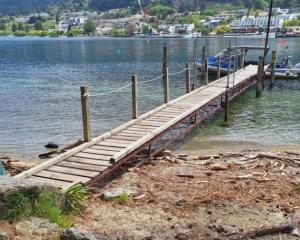
A hospital insider, who spoke to the Otago Daily Times on the condition of anonymity, said nurses and doctors were at breaking point, working over capacity in a hospital with no air conditioning during the hottest summer on record in Wakatipu.
Frankton's hospital - opened in the late 1980s - has no insulation and no air conditioning.
The source told the ODT staff had been asking for cooling systems for years, but have been told ''there isn't enough money'', to ''be patient'' and it would be included in the proposed redevelopment, for which a detailed design has not yet been completed.
However, staff were ''absolutely exhausted'' and feared they would make ''serious mistakes'' because they were unable to think straight due to the temperatures they were working in.
''It's a mentally and physically demanding job ... [staff are] supposed to be making life-and-death decisions.
''Try doing CPR for 10 minutes in a room of 28degC.
''As a workforce, [they] are hot and ... exhausted [and] scared [they're] going to make a mistake.
''The building is breaking, but the staff are broken.''
Families of patients are understood to have had to buy fans to try to keep their loved ones comfortable while in the hospital.
The ODT understands staff have filled out incident forms, tabled the issue at meetings, with the Occupational Health Services manager and others within the organisation, to no avail.
Southern DHB chief executive Chris Fleming said the only areas at LDH fitted with air conditioning were ''the pharmacy rooms''.
''However, staff have been doing a great job with the assistance of fans, opening windows, drawing curtains, and [providing] plenty of cool water to prevent dehydration.
''Heating and cooling systems that meet council requirements is part of the proposed development of the hospital.''
Mr Fleming said the detailed design phase should be completed in May, after which consent would be lodged.
He expected the project ''completed by July 2019''.
However, WorkSafe southern region assessments chief inspector Darren Handford said employers ''must ensure the safety of their workers'' by minimising or eliminating hazards, such as ''heat stress''.
If that could not be done ''the only option you have is to stop work'', he said.
''If we use the CPR example, you can't postpone the application of CPR [which can cause heat stress] - then what you actually have to do is things around minimisation control measures.''
Workplace health and safety representatives had the power to issue a ''provisional improvement notice'' to the DHB to ensure the duty holder took the matter seriously.
''If they haven't done that, then WorkSafe would be asking ... `Why not?'.
''That would potentially highlight to the regulator there could be other issues ... that would require a further view from the regulator,'' he said.
WorkSafe encouraged any worker who felt their concerns had not been addressed internally to lodge a complaint through its 24-hour hotline, but said Mr Handforth said the regulator ''will now be taking a greater interest''.
''Clearly, what I hear is that there is the potential for heat, which is likely to be a hazard [at LDH].''











